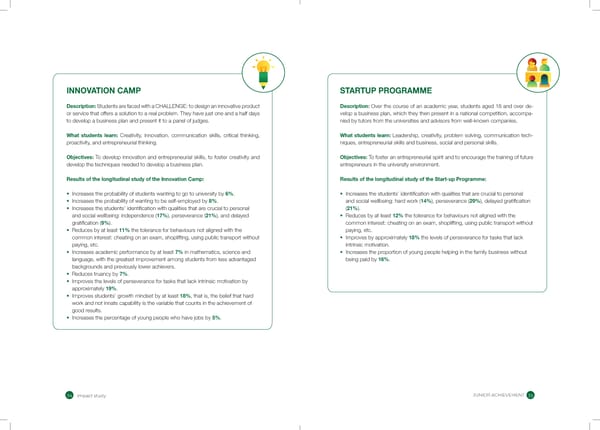INNOVATION CAMP STARTUP PROGRAMME Description: Students are faced with a CHALLENGE: to design an innovative product Description: Over the course of an academic year, students aged 18 and over de- or service that offers a solution to a real problem. They have just one and a half days velop a business plan, which they then present in a national competition, accompa- to develop a business plan and present it to a panel of judges. nied by tutors from the universities and advisors from well-known companies. What students learn: Creativity, innovation, communication skills, critical thinking, What students learn: Leadership, creativity, problem solving, communication tech- proactivity, and entrepreneurial thinking. niques, entrepreneurial skills and business, social and personal skills. Objectives: To develop innovation and entrepreneurial skills, to foster creativity and Objectives: To foster an entrepreneurial spirit and to encourage the training of future develop the techniques needed to develop a business plan. entrepreneurs in the university environment. Results of the longitudinal study of the Innovation Camp: Results of the longitudinal study of the Start-up Programme: • Increases the probability of students wanting to go to university by 6%. • Increases the students’ identi cation with qualities that are crucial to personal • Increases the probability of wanting to be self-employed by 8%. 14%), perseverance (29%), delayed grati cation and social wellbeing: hard work ( • Increases the students’ identi cation with qualities that are crucial to personal (21%). 17%), perseverance (21%), and delayed • Reduces by at least 12% the tolerance for behaviours not aligned with the and social wellbeing: independence ( grati cation (9%). common interest: cheating on an exam, shoplifting, using public transport without • Reduces by at least 11% the tolerance for behaviours not aligned with the paying, etc. common interest: cheating on an exam, shoplifting, using public transport without • Improves by approximately 18% the levels of perseverance for tasks that lack paying, etc. intrinsic motivation. • Increases academic performance by at least 7% in mathematics, science and • Increases the proportion of young people helping in the family business without 16%. language, with the greatest improvement among students from less advantaged being paid by backgrounds and previously lower achievers. • Reduces truancy by 7%. • Improves the levels of perseverance for tasks that lack intrinsic motivation by 19%. approximately • Improves students’ growth mindset by at least 18%, that is, the belief that hard work and not innate capability is the variable that counts in the achievement of good results. • Increases the percentage of young people who have jobs by 5%. JUNIOR ACHIEVEMENT ׁׂ٪ Impact study ׁ׃
 Junior Achievement Foundation Page 17 Page 19
Junior Achievement Foundation Page 17 Page 19